
In Pictures: 29 Foods With “Health Claims” That Are Deceiving You And Making You Sick

Just the other day a friend came over and said “everything causes cancer, so I’m just going to eat whatever I want.”
Seeing as how this is a pretty common thing to joke about, I started thinking: why is it so hard to figure out what’s healthy?
And how should people figure out what do eat to stay healthy, anyway, if it’s apparently that difficult?
Well, I not only want to show you here that it’s not hard figuring out what to eat, but also that there are a few key rules that make it incredibly easy to figure out. Seeing as apparently 47% of Americans agree with this statement that “everything causes cancer” (in other words, there’s ambiguous information on what’s healthy food) I did some research.
Naturally, I took my research to the grocery store.
Foods With Health Claims: The Surprising Ways That Food Companies Try to Trick You
I casually walked through every aisle of the grocery store and picked out things with labels that could be considered misleading, or otherwise made you think the product is healthy. Things that children or uninformed people might fall for.
The first one? Snapple.
#1 Snapple “Juice Drink – All Natural”

Ahhh all natural eh? Big green text that claims this is all “natural.” Sure! Maybe it is.
But with 46g of sugar, I highly doubt that. That’s enough to make a horse diabetic.
All natural, yeah it’s great for you!
We instinctively read “all natural” and are disarmed. As you’ll see in the next few minutes, this is a very common tactic for getting you to think things are healthy and that natural = always healthy, when in reality there’s usually a lot of other stuff added.
#2 Quaker Oats: “Heart Healthy Whole Grains”
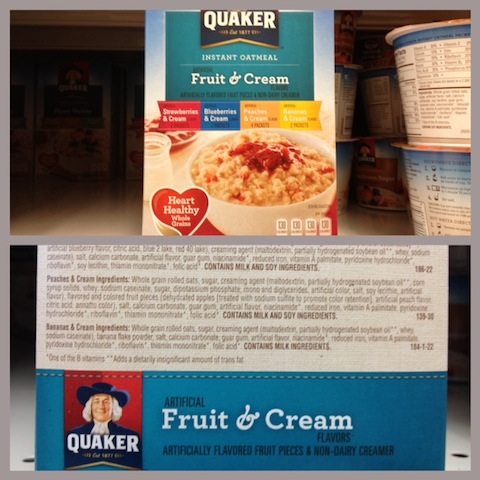
With a big heart saying “heart healthy whole grains” you know this must be a health food, right?
Yeah.. until you flip it over and read, “ARTIFICIAL Fruit & Cream FLAVORS” which are conveniently written in an off-color that blends in, in a smaller font. Each part of the oatmeal (the flavoring, the oats, the fake fruits) has an ingredient list 30+ items long too.
Trickery at its best.
Heart healthy, for sure!
#3 Raisin Bran – “Good Source of Fiber & Made With Whole Grain!”
This is a little scary to me – that sugared up breakfast foods can be marketed to kids and moms trying to convince them that there’s actually healthy stuff in it, when they know there isn’t.
Yummy fiber! Yummy whole grains! Don’t forget the 19g of sugar and the ingredient list 50 items long!
This is taking advantage of selective attention at it’s best – provide a little positive about something to help draw attention away from the negative and obvious.
#4 Kellogg’s “Fiber Plus Antioxidants”
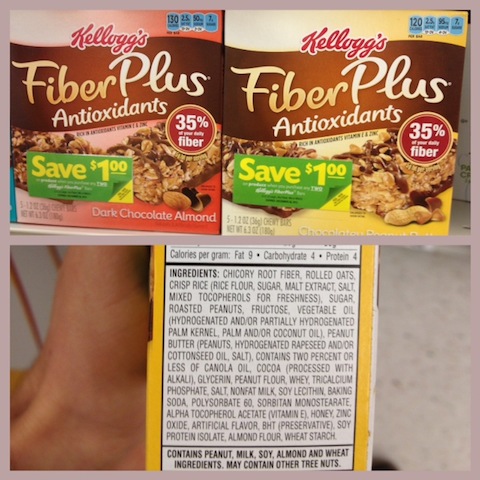
Yayyyy I need more fiber to poo, right!? Fantastic! These will do great.
Wait. I can get antioxidants from a dessert bar too?! OMG!! Sinfully delicious!
This one I call the “too good to be true.” You know it’s a dessert bar. But there’s good stuff in it?! Win!
But when you read the ingredient list, it’s 30+ ingredients, with half a dozen preservatives and words I can’t pronounce.
And that’s saying something because I majored in Bio in college.
#5 Pop Tarts “Good Source of 8 Vitamins and Minerals”
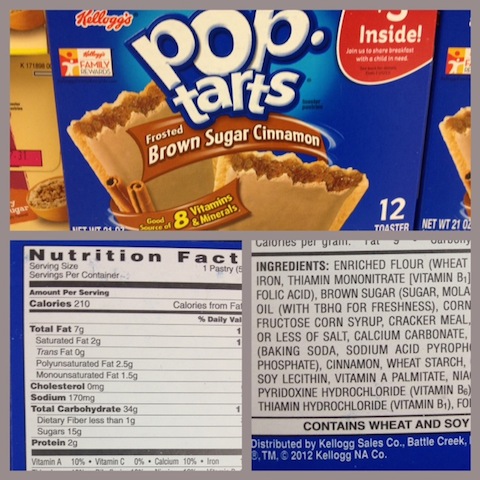
I’m amazed that people fall for this.
Pop tarts. A good source of vitamins and minerals? Are you kidding me? I almost wanted to bring an uzi into the poptart factory and start shooting. The sad thing is that people fall for this.
The ingredients in pop tarts are a high school science experiment – there is nothing that even resembles food anywhere on the label. Pretty much the only real foods on the entire label are cinnamon and brown sugar.
But I think psychologically it does something interesting… when we see pop-tarts, most of us are like “Okay, I know it’s bad” and then make a decision.
But once they add “Great source of antioxidants, calcium and minerals!” it suddenly sounds a little be less sinful, right?
#6 Chocolate Milk – “Vitamins A&D 37% Less Fat Than Whole Milk!”
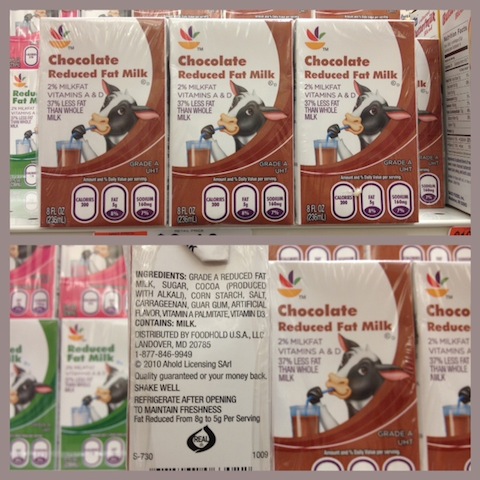
Ingredients? Okay, so there’s actually milk in this. Good sign.
Ingredient #2 = sugar. Ingredient #3-6 = cocoa mix science experiment & preservatives. Ingredient #4 = Artificial flavors.
De-lish.
#7 Arizona Iced Tea “NO Calories!”
At first we’re like, “oh, sweet, no calories!?” But that should raise some huge warning bells. How can you consume something (unless it’s water), without it having any calories? How in the hell does it have substance?
When you see splenda, acesulfame potassium, sucralose and virtually all of the artificial sweeteners, that should make you stop and think.
In the next week or two I’ll have a long post on the research behind all of these additives. I’ll save you time though: you don’t want them in you.
#8 Frosted Flakes “Good Source of Vitamin D!”
Some more selective attention. “Look mommy! I can get vitamin D from this!”
You know where else you can get it, kid?
By turning off your damn computer and playing in this thing called S U N L I G H T.
In any case, you’re looking at 11g of sugar (better compared to some breakfast cereals), preservatives, and a long list of artificial flavors.
No, Tony, they’re not GRRREAT.
#9 Juicefuls “Juice Filled Fruit Snacks – 100% Real Fruit Juice In the Center, Made With Real Fruit!”
Hehehhee.
Ingredient #1 “juice from concentrates.” “Made with real fruit.” But what they neglect to tell you is that it’s 2% fruit juices, and 98% dyes, sweeteners, and preservatives.
Yep, there’s fruit juice in there all right…. about a tear drop worth.
#10 Kraft Easy Cheese “Made with Real Cheese!“
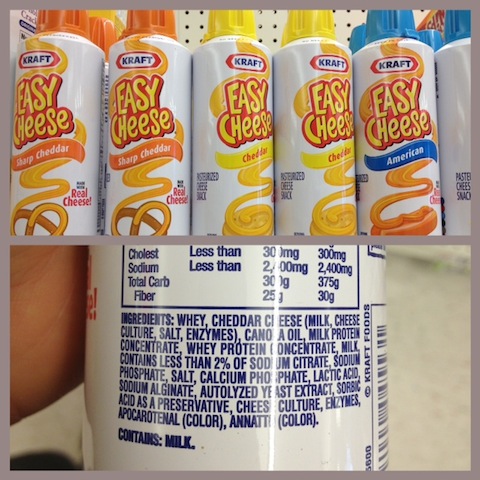
Okay, let’s start with a fun game first:
Does it really seem likely that cheese could come out of a spray can?
In reality, there’s not really cheese in there at all, it’s a clever mix of whey and milk protein with other additives that make it somehow seem like cheese.
Oh, and then other goodies to make it taste like “bacon flavored cheese” (gross).
#12 Lucky Charms “With WHOLE GRAIN First Ingredient!”
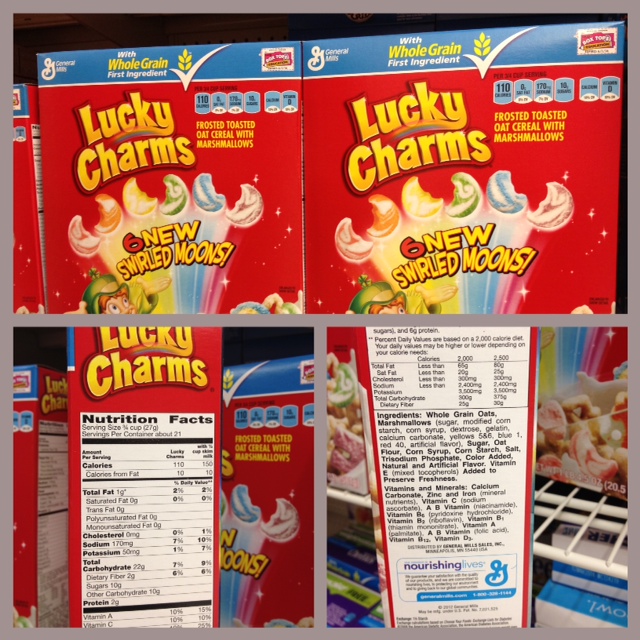
Woohoooooo, we’re getting whole grains in the cereal!
Don’t mind the 10g sugar, 170mg sodium (how is there that much salt in cereal, anyway?), marshmallow sugar, more sugar, corn syrup, added colors, artificial flavors, preservatives, and other goodies. Those are okay though. There’s whole grains in there folks!!
Sigh..
#13 Tradewinds Slow Brewed Ice Tea “100% Natural”
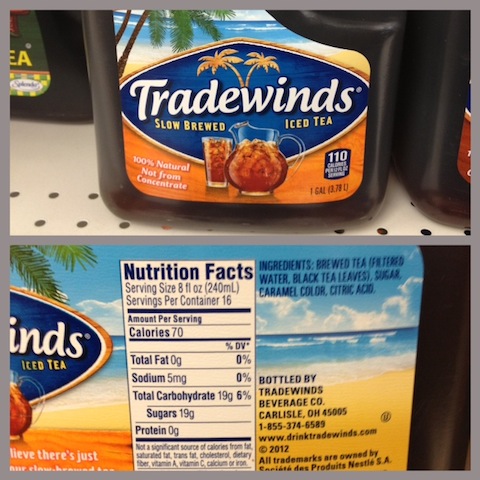
To be honest, this one isn’t that bad. The first ingredient is brewed tea. Victory!!
Unfortunately here’s 19g of sugar in one 8 oz serving, in addition to some yummy caramel color.
If you’re into reading science journals, read this toxicity report on a common issue with caramel colorings.
So, no, this isn’t 100% natural. Yeah, the teabag and water are natural, but not the 19g of added sugar making you obese.
#14 Campbell’s Chicken Noodle Soup – “Healthy Request – Heart Healthy, 0g Trans Fat”
Heart healthy? DERP.
Let’s start with this one. In that one bowl of soup, there’s about %40 of your daily sodium intake. In just 140 calories of soup.
The noodles have an ingredient list 20 items long. Preservatives, artificial flavors, and other fun stuff!
Then we get into the chicken (this part is funny). The first ingredient in the meat is “mechanically separated chicken.”
Uhh…
Generally I put this in the “eat at your own risk” category.
#15 Betty Crocker Sour Cream & Chives “Made with 100% Real Mashed Potatoes.”
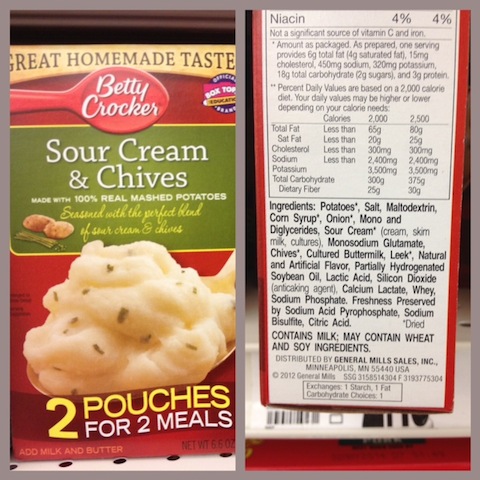
See, the problem with saying “100% real mashed potatoes” is that I envision someone stuffing already made mashed potatoes into a box, then maybe adding some slight preserving solution, and voila it’s ready for me! Maybe that’s how you envision it too.
Let me tell you what’s actually in this…
Potatoes, salt, MSG, Artificial Flavors, Hydrogenated oils, silicon dioxide, and another half a dozen preservatives to keep it fresh.
All this time I thought Betty Crocker cooked those mashed potatoes and put them into a nice to-go bag for me! Arggggg
“Made with 100% real mashed potatoes” means “Yea, there are a couple potatoes in here.. mashed in with a bunch of preservatives and other things you can’t pronounce.”
#16 Dole Fruit in Gel “All Natural Fruit”
This one was interesting.
You’d think that, seeing as I can see the fruit in there, they would be telling the truth.
Well, yeah, there’s fruit in there… but the third ingredient is sugar (22g in each container), the fourth is an artificial sweetener, and the 5th, and the 7th, and a hell of a lot more.
So yeah, I guess there’s fruit in there, in addition to a whole bag of other fun goodies.
#17 Chocolate Cupcake Pudding “As Much Calcium As an 8oz Glass of Milk!”
Selective attention once again.
Great, calcium like there is in milk.
There’s the subtle “Hey, there’s something good in this… it’s okay to buy it” hint. When in reality, you’re getting calcium, but also sugar, hydrogenated oils, and a half dozen colors and preservatives.
#18 Kool Aid- “Good Source of Antioxidant Vitamins C & E – 35% Less Sugar Than Leading Regular Sodas”
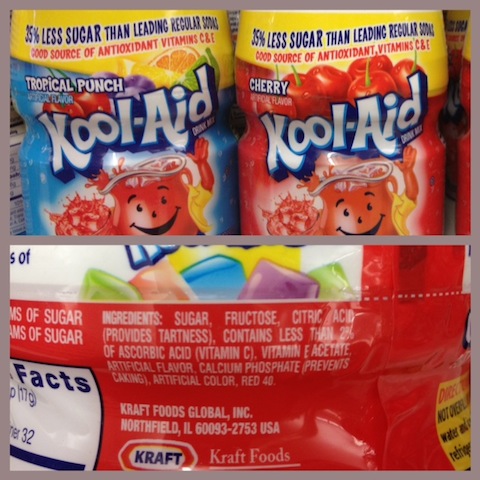
Apparently, since vitamin C & E are antioxidants, and since you can add them via ascorbic acid to food, even food that is obviously unhealthy can make health claims on the front of the package.
I think kids (in particular) sometimes get misled and think “Yummmmy it tastes like vitamins mommy! And look, it says there’s vitamins!!!”
Unfortunately, kool-aid is another high school science lab experiment. The first two ingredients are the sweeteners – sugar and fructose – and then a dozen other preservatives, flavoring agents, and artificial colors. No sign of real food anywhere in this cocktail.
#19 Heinz Ketchup “Grown Not Made”
To be honest Heinz is not that bad – As far as preservatives, additives, dyes, etc. go. But it does give you a misleading idea that it’s all “grown, not made” and that it’s totally healthy.
It might have been ten years ago, but now they proudly have high-fructose corn syrup and corn syrup as the third and fourth ingredients.
Seeing as we’re in an obesity epidemic, and high fructose corn syrup (HFCS) has been shown to have a whole host of issues related to that, this one is out of the running too.
Read more about HFCS here, here and here. (Dorky science talk, read at your own risk)
#20 Powerade “Advanced Electrolyte System: Vitamins B3, B6 and B12”
Let’s start with the obvious: since when did we need powerade to replenish electrolytes?
Hasn’t this thing called, uh, water (+ food & fruits) done the job for the past, say, couple hundred million years?
Alright. Let’s give powerade the benefit of the doubt. Let’s assume it actually is a lot better to replenish thirst than water.
But let’s look at the ingredients now.
#1 water, #2 high fructose corn syrup (20g sugar in this drink), yellow 5, and some other goodies.
The irony is that if you did a hard workout, and then drank this gatorade after, you’d see yourself getting progressively fatter due to the sugar and calories it has anyway.
So you might not want to give your kids this after soccer practice…
#21 Minute Maid Fruit Punch “Made With Real Fruit Juice”
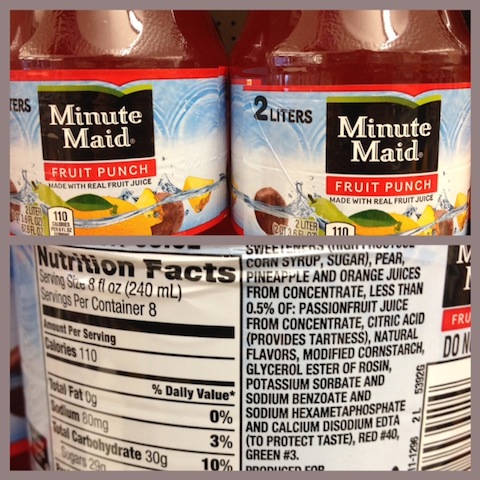
Now this is funny.
Ingredient #1 is water. So far so good.
Ingredient #2 is the list of sweeteners – high fructose corn syrup, sugar.
Finally, ingredient #3 is the fruit juices. But whats scary (and important to know) is that the higher up sugar and HFCS appear on the ingredient list, the more there is, and the more it makes up the drink or food you’re consuming.

So, not only is there a LOT of sugar in this, there are also several dyes and several preservatives. This story is becoming pretty repetitive, right?
#22 Waist Watcher Diet Root Beer
This one was just hilarious so I had to put it in here.
Waist watcher. Diet. Soda?
You know something is funny here, right?
This falls in the category of “have your cake, eat it, and not get fat.” You know it’s not true.
Keep these paradoxes in mind.
#23 Pepsi “Throwback Made with REAL Sugar”
This one is pretty hilarious too.
Made with real sugar!? I can FINALLY drink soda now, since it’s all natural!
I swear to god I’ve heard people say this. I have literally heard people say “it’s natural sugar!” and ignore the fact that one cup has 40g of of this “natural” sugar.
Natural or not, have fun with the “natural” diabetes you get from drinking this regularly..
#24 Pillsbury Chocolate Chip Cookies “100% Real Chocolate!”
No way!? There’s just chocolate chips – pure chocolate in here? Sweet! Pillsbury made a come around.
Well, not really.
You’ve got “chocolate chips” in there, in addition to artificial flavors, hydrogenated sobyean and cottonseed oil, and the other typical stuff you usually find in foods made in labs.
#25 Top Chef “Healthy Choice – No Preservatives” Frozen Meal
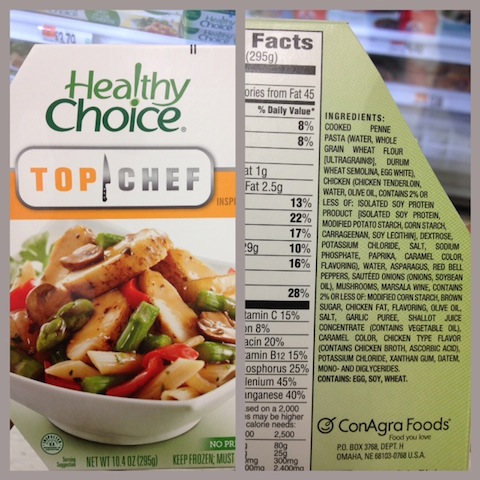
No preservatives. Really?
I don’t know what the FDA classifies as preservatives. But in any case, I’ll point out a couple interesting things:
- Caramel color
- “Flavoring”
- “Chicken type flavor”
Hmmmmmm… something to ponder.
#26 Freschetta “Naturally Rising Crust” (Sneaky one here, read on)
While I was reading the cover of this pizza box, I thought it was quite strange that they mentioned that it had a “naturally rising crust.”
Uhh… aren’t all frozen pizzas you put into the oven naturally rising? So why would they mention it?
Well, “naturally” is conveniently featured in big green letters – the same ones you typically associate with “healthy” or “organic” food labels.
In other words, it’s a direct attempt to play with your psychology and for a split second make you think it’s remotely healthy.
That is, until you see the ingredient list.
Not only is it one of the longest ingredient lists I’ve ever seen, they take the sneakiness up to another level: they bold each major word in the ingredients list, so you think you’re just seeing bacon, garlic, etc. But once you read what the bacon is made of is where it gets hairy.
More clever tricks to try to convince you that it’s not as bad as it really is.
#27 Eggo Waffles “Protein Original – Good Source of Protein!”
More selective attention at its best.
Yay, 8g of protein? You mean I can now get my protein from eggo waffles instead of eating eggs for breakfast? HELL YES!
Well, yeah you get 8g protein. I’ll give you that.
But you also get sodium aluminum phosphate, yellow 5, yellow 6, and 390mg of sodium in just one serving.
Classic case of of “you should probably keep reading the label to see what else is inside.”
#28 Minute Maid “100% Natural Flavors”
This is deceptive marketing at its best.
You look on the container and see fresh fruits. It looks healthy. It gives the illusion of being healthy.
But when you read the label you see that high fructose corn syrup is higher on the list than fruit. Apparently, those “fruit juices” make up that less than 1%. So yeah, sure, there’s fruit juice. But 99% is high fructose corn syrup and flavoring mixed in water.
Sneaky, sneaky people.
#29 Welch’s Fruit Snacks ” Family Farmer Owned Made With Real Fruit, Fat Free, No Preservatives, 100% Vitamin C”
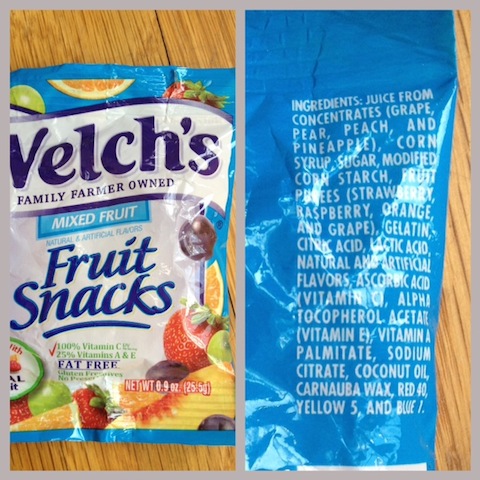
Unfortunately, these bad boys are one of my favorite cheat foods.
It looks great on the front, they deceive you with the whole “family farmer owned” BS which makes you feel like they’re your friendly neighbor Bob.
Then it says “made with REAL fruit.” Well, actually, some fruit juice. Quickly followed by high fructose corn syrup, sugar, artificial flavors, and then a couple different dyes.
Sorry Welch’s, you sure taste good but you can’t fool Alejandro!
The 5 Sneaky Tactics Underlying These Labels
Underlying all these labels are a few common methods of tricking you.
#1 The “too good to be true” promise.
“Weight watchers soda” see #22
#2 The “calorie free” promise
If there aren’t calories, and you’re consuming something other than water, you should be worried. Usually that means they’re loaded with artificial sweeteners which have questionable effects on the body.
#3 The “have your cake and still lose weight” promise
Low calorie type labels often are low on calories but high in something else. Salt or sugar are usually the big two. Toss in some dye, artificial flavors, and voila, you’ve got your typical supermarket concoction.
#4 The “this has good stuff in it, I swear” promise
Selective attention – 8 g of protein! woohooo, but that’s not all. Sure, it’s got “real fruit” (1%), but it’s also got a whole host of other crap.
#5 The “look, my label is green and mentions ‘natural’ and looks like it should be on the cover of a healthy food box”
Putting fruits, fresh veggies, and mentioning “natural” on the front are all ways of deceiving you.
So How Am I Supposed to Know What to Eat?
So, let’s go back to the conversation with my friend (who thinks that everything causes cancer).
I told her, “Just eat real food.” (Which is something I often talk about in regard to weight loss, too).
How do you know what’s real food?
Uhhh… the same way a squirrel knows what to eat.
That means, ideally:
- Nothing in a box
- Something you can pull from the earth and eat (plants)
- Something that eats things that you can pull from the earth (animals)
- Foods in the, uh, food section of the market: the fresh section with produce
If you eat things in a box:
- Health food stores do a good job weeding out most of the bad stuff
- Watch out for more added sugar and salt
- Use common sense – if it sounds weird or too good to be true, it probably is
- Ask yourself: Would grandma know what this is?
Take It Away Folks…
Just leave a comment below and let me know what you think.
Oh, and go ahead and add Modern Health Monk on Facebook.
Thoughts on these clever scalawags in the food industry?
Hit me up below —
— Alex
Sources: Cancer stats via National Cancer Institute

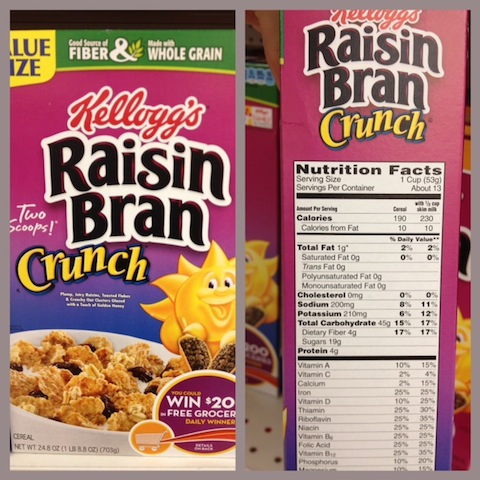
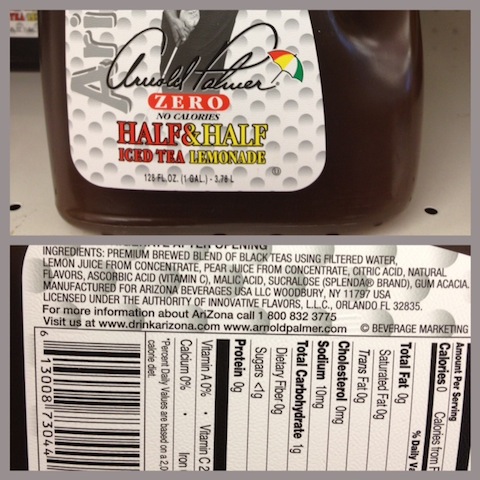
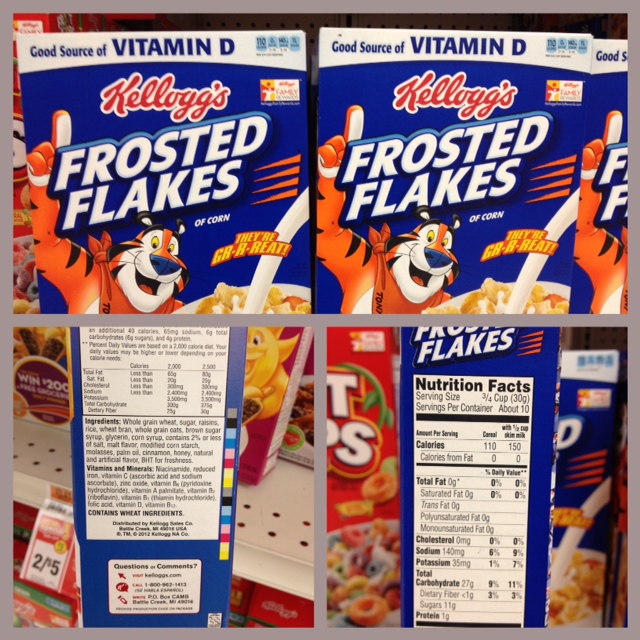
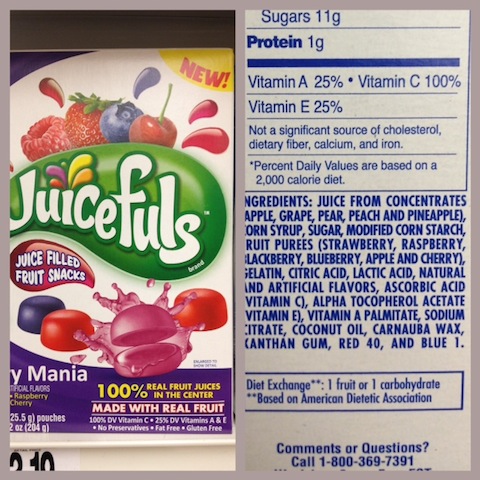

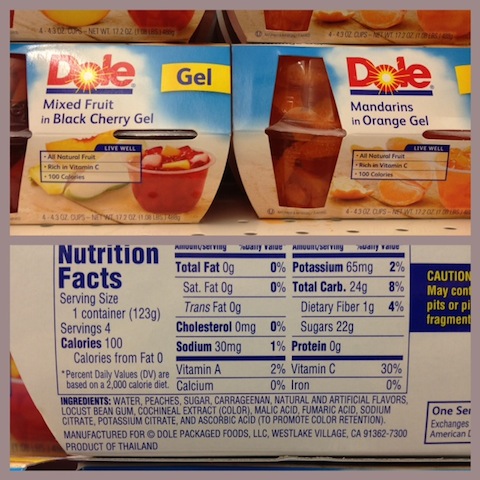
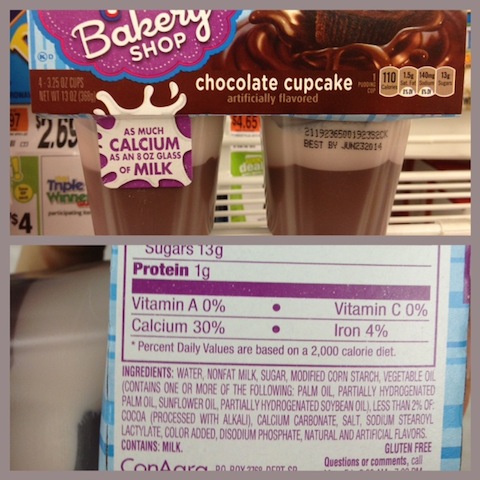
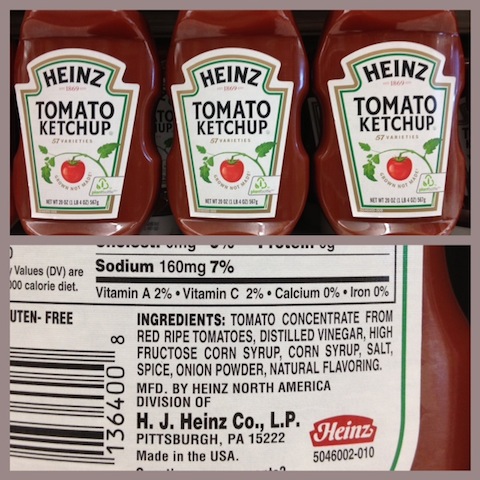
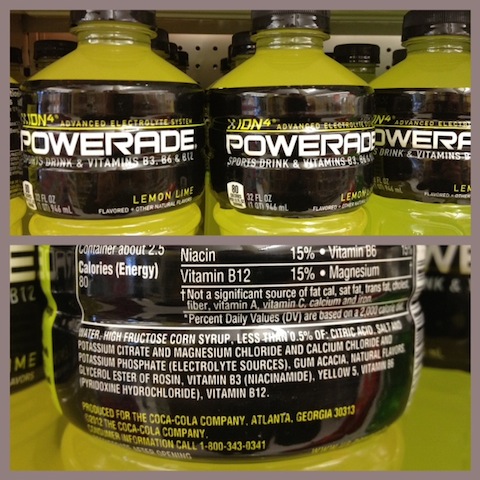
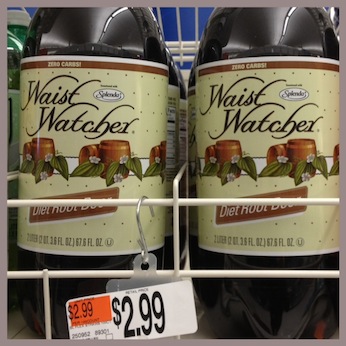
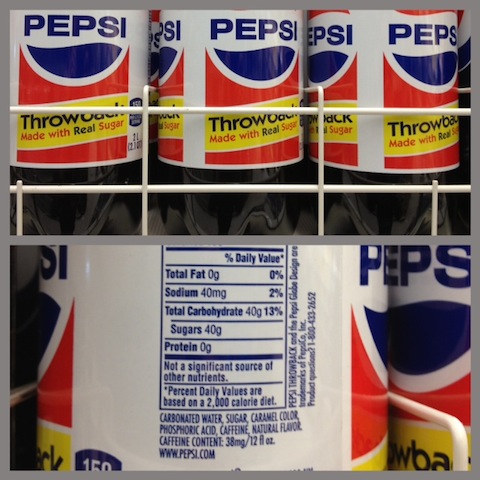
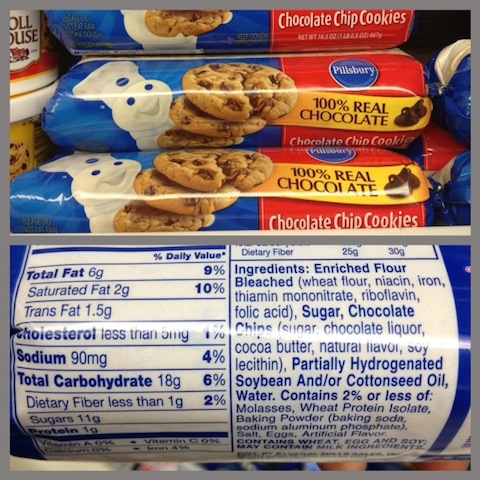
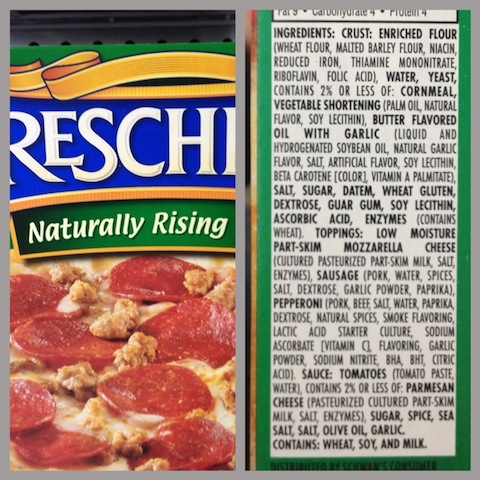
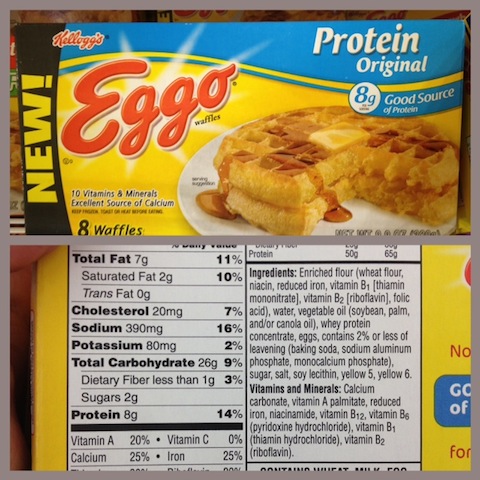
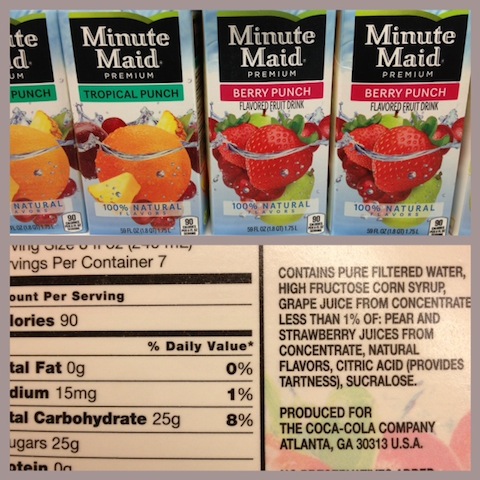
Is this serious? Every post you make is just a string of photos with 2 sentences underneath.
What the hell is the point?
To educate the masses that POPTARTS and CEREAL aren’t healthy?
Doing gods work I see.
Hey Kerea —
You’re right, people already know that poptarts and sugared cereals aren’t healthy.
But my point here was threefold:
A. It’s a little scary that food companies can put deceptive labels on foods we already know are unhealthy. I’ve first-hand see people say “oh, look, it’s all natural!” and then never question the food from then on out.
B. The whole “all natural thing.” People think if a label says it’s natural, it’s fine to eat. Well, snapple is “natural” but with 46g of sugar the only natural thing you’re going to get is diabetes. In some less obvious examples (the non-junkfood ones), there are claims about health, vitamins and minerals, but there are a half a dozen other additives in there.
C. Addressing the “everything causes cancer” bit that so many people go on about. And how to actually figure out what’s healthy and what’s not, since a lot of people apparently don’t know that sugared up cereal is not the most nutritious breakfast.
Hope that answers your questions/concerns .
— Alex
It’s sad that people don’t know what real food is any more. Real food does not come in packaged boxes and cans and has a limited shelf life. I know not everyone can afford nor have the time to prepare meals from whole foods but if they would just stop and think about the cost of not eating healthy – you pay it now or later when you are sick. If you have to read the label to see what is in it, maybe you shouldn’t be buying it.
I wish someone had told me early in life we were meant to eat food grown from soil and not rely on man made chemical products. One of the best lines in a documentary I heard was what a Pakistani student told his college roomate – “do you know what one thing the Americans fear the most – inconvenience”. How true is that statement when it comes to spending our time and effort to do something good for ourselves when it comes to eating.
We all need to be made aware and educate ourselves so that we can make good choices and take control of our own health instead of someone else figuring out what is best for us.
Ok, I’ll get off my soap box!
I agree Lisa. I think it’s also interesting that people need to be reminded what real food is.
It’s a tough bargain though – many people don’t see their bad health slowly creep up on them. You know how it is being human, we often take the easy way in the short run even if we know it’s harmful in the long run.
TOTALLY with you on the inconvenience thing. It’s like we think we can get everything faster, easier and better, without sacrificing quality. Naturally, that’s generally not true.
I’m with you there, preach it !
A. It’s a little scary that food companies can put deceptive labels on foods we already know are unhealthy. I’ve first-hand see people say “oh, look, it’s all natural!” and then never question the food from then on out.
-Agreed
B. The whole “all natural thing.” People think if a label says it’s natural, it’s fine to eat. Well, snapple is “natural” but with 46g of sugar the only natural thing you’re going to get is diabetes. In some less obvious examples (the non-junkfood ones), there are claims about health, vitamins and minerals, but there are a half a dozen other additives in there.
– Nice blanket statement. With 46g of sugar I’ll get diabetes? You can’t even pronounce the ingredients, why should I trust you to know these additives actually have negative effects? What’s your background beside “I majored in bio”?
C. Addressing the “everything causes cancer” bit that so many people go on about. And how to actually figure out what’s healthy and what’s not, since a lot of people apparently don’t know that sugared up cereal is not the most nutritious breakfast.
– When did you address cancer one time after the opening post? If you are going to explain things, then explain them.
Hi Kerea –
46g of sugar making you diabetic was clearly a joke. And it was also a joke that I can’t pronounce the ingredients, even as a bio major who spent lots of time in labs. As you can tell, much of the post was quite a bit sarcastic and written in jest.
Re: credentials – I’m also a personal trainer, have spent a lot of time in the industry, and spend way too much time reading JAMA, NEJM and the like. No one’s forcing you to trust me though.
Stick around for future articles, I’ll be happy to link to a dozen studies citing the negative effects of the substances I talked about in this post.
Re: cancer, I definitely got sidetracked. The point I was trying to make was that instead of reading every little label and analyzing every nutrient trying to figure out what’s healthy, when you eat real food you dramatically lower the risk of heart disease, cancer, diabetes, and many other diseases. I’ll make my points clearer next time.
Best,
Alex
I think the title of this article is awful. No food makes you ugly. The items you discuss do have health impacts (although the list is a bit repetitive) but think for a minute before you say they make you look a certain way. Fat – maybe but ugly – no.
Hi Jennifer —
You’re right, I originally had the title to grab attention but I’ll change it to something less offensive.
Yeah… I’m pretty sure my Grandma never ate yogurt from a tube. I’m desperately trying to eliminate anything processed from my diet but it’s very challenging. I’m enjoying your website a lot! Thanks!
Hey Holly –
Hahah I would love to hand my grandma some yogurt in a tube and see what she thought about it.
What’s your biggest challenge in eliminating processed foods?
Thanks for stopping by !
Alex
Did you know that washing your foods is considered “processing” therefore processed food can be good for you too! (The USDA considers washing, cutting, and cooking to be processing). Apples are processed, carrots are processed, these foods are just “minimally processed”. Please understand that processed food can be healthy too and that the public is misinformed about what processed food even is. There is a spectrum of processed food and if you do not process your food you risk getting ill from E. coli and other foodborne pathogens.
Sincerely,
A Food Science Major
Hey Emily,
Thanks for sharing – great points all around that you made. I think you’re mixing up my definition of processed food though ;-). See here: http://modernhealthmonk.com/what-is-processed-food/
Mostly in referenced to packaged, processed food – not minimally processed veggies.
I don’t agree with your criticism Kerea, you make assumptions on Alexander’s behalf, while you obviously don’t know anything about his background.
I appreciate the combination of humor and facts in your articles, it wasn’t difficult for me to separate it from the seriousness of the article, at all.
Oh, btw you don’t have to have majored in anything in order to be qualified to discuss nutrition. You just need a basic insight in biochemistry and be a very good science researcher in order to dissect the bullshit lies from all the biased company fonded observational studies which are spread around like a plague.
All this garbage is getting picked up and published by careless uneducated journalists (who couldn’t cite a clinical study if their life depended on it) on various mainstream news magazines. Unfortunately that kind of information is what regular folks read, not informative blogs like this one.
++++
It unbelievable that we’re still talking about these disgusting high carb / sugar / additive processed junk foods in 2013! The fact that they are still getting produced en-mass is a testament to how increasingly corrupt the system has become!
I agree with the statement often made, that you have the right to eat whatever you want if that’s your choice, but misleading ignorant people with exaggerated and borderline false statements on food labels should be downright ILLEGAL.
I enjoy reading your blog, keep up the good work Alexander!
Hey Dave,
Yeah I totally am with you there. It’s mindblowing to me that we are STILL having these discussions… but as long as there’s manipulation and people who don’t see through it, I’m going to be here pointing it out and exposing it. I’m with you – too bad these things can’t be made illegal. It’s usually the uninformed or children who get screwed by these kinds of subtle manipulation.
Thanks for stopping by!
— Alex
Hi Alex, heard your question at a recent Smart passive income podcast and had to come and check out your blog since it’s somewhat related to mine.
I do agree with most points you make here, but just would like to point out that not everything artificial is that bad and many natural things can be bad. Fruit juice for example, yes it has some vitamins but also tons of high GI carbs that are going to mess your hormones and cause weight gain. Contrast that to artificial sweeteners. I tend to get irritated when people bash them based on bad science or just parroting what other health ‘authorities’ claim (e.g. Mercola). There are studies that show people who drink artificially sweetened sodas are fatter, but even a basic understanding of research methods shows why you can’t conclude anything from that. Especially when there are intervention studies showing artificial sweeteners have no effect on weight loss or gain. Modern science does occasionally make it possible for us to have our cake and eat it too.
As to whether those sweeteners are safe, most health authorities, organizations and food scientists seem to think so. There are of course always individual studies that show harm, but evidence as a whole suggests they are safe. If you know some papers that say otherwise, I’d be happy to look at them and talk about this further.
I think the health niche needs more reliable and evidence-based information and less mindless hyperbole and fear mongering (we already have Mike Adams and his naturalnews.com for that).
Hey Seppo,
You’re right, not everything that is artificial is bad, and many natural things can be bad.
If you look around the site you’ll see virtually everything I write is supported by science – I almost always have citations within every single post, and very rarely do I go into the sort of “fear mongering” that polarized “natural news” sites go into.
My point of this article was merely to show people (who often email me saying they’re confused about what to eat), that real food is easy to find.
Health doesn’t need to be overly complicated – you can 80/20 it by eating foods that are real, fresh, and not out of a package. Rather than reading labels, just buy actual food.
In any case, that was the point I was trying to make. I probably didn’t do a good job explaining that.
Again, this wasn’t specifically about artificial sweeteners – but what percentage of the time are artificial sweeteners found in combination with high amounts of sugar, dyes, and coloring agents? Usually the presence of artificial sweeteners is a sign that there are other things you don’t want to be eating.
I definitely don’t intend to be another naturalnews – if you read around the site more I’m sure you’ll see everything is loaded with citations and dozens of scientific studies to back it up.
Re: science on artificial sweeteners, here are a few:
http://www.ncbi.nlm.nih.gov/pubmed/18850355
http://www.ncbi.nlm.nih.gov/pubmed/17805418
http://www.ncbi.nlm.nih.gov/pubmed/22385158
Generally the evidence is conflicting though.
Thanks for stopping by,
Best,
Alex
Hi Alex,
Sorry, didn’t mean to come off as an asshole, wasn’t my purpose 🙂 And I didn’t mean to imply that you are like NaturalNews, just that there are too many health sites that parrot spew stupidity like NN does.
I do agree with almost every point you made in this post. Most of the foods you listed shouldn’t even be considered as foods. I don’t even remember when I last time ate anything resembling those, except for the occasional sweet or ice cream. And putting health claims on pure sugar and junk is disgusting and more than a little bit ethically troubling.
Re: artificial sweeteners, anything can cause cancer in rats when given in high enough doses, even vitamin C. Especially if the data comes from a dubious organization like the Ramazzine Institute (http://www.forbes.com/sites/trevorbutterworth/2012/04/24/controversial-italian-scientist-says-splenda-causes-cancer/).
To my knowledge, little if any risk has ever been demonstrated in humans. This review found a slight inrease in bladder cancer with very high doses or artificial sweeteners, but the risk was smaller than for heavy coffee drinkers. So it’s hard to know what to make of that.
http://annonc.oxfordjournals.org/content/15/10/1460.long
Hey Seppo,
Haha no problem, the health space is tough to be in – it’s a highly personal area to many people.
You’re right about the rat studies – they aren’t always accurate predictors of the effects in humans, and obviously we aren’t allowed to do human trials on many of these things. Nobody knows how it would translate in a human study.
Generally the risk is also very low, even when consumed in high quantities, but the problem (that I see), which again is just my opinion and not very scientific, is that we’re surrounded by carcinogens in the 21st world – whether that’s sniffing gasoline every day filling up the car, or living in a polluted city like Beijing, or eating food that has been tampered with, there are many many risk factors surrounding us. For me, it’s just a matter of minimizing those.
I generally don’t caution people to stay away from artificial sweeteners “just because.” Usually (like I mentioned before), beverages that have artificial sweeteners are also loaded in sugar and calories anyway – so they’re foods I don’t eat.
You’re absolutely right though that there’s weak evidence (at least to my knowledge – and again, I haven’t thoroughly investigated this) of the effects in human.
On another, more visceral level: wouldn’t it scare you if a frequently consumed beverage of yours created tumors in rats?
Everything causes cancer – especially life 🙂
Anyway, In my opinion the best reason to avoid artificial sweeteners is that you don’t get hooked on sweet taste, because that can easily lead to over consumption of sugar and other really bad stuff.
Nice article. I wish more people would become more accepting of the crap that is poured into our food everyday and that we train our children to believe that it is healthy, when it’s really not. We are consumed by deception everyday…and it’s lurking in our kitchens!
Hey Serah,
I know 🙁 Unfortunately there is quite a bit of deception in the food industry. Fortunately, the remedy is simple – just eat real food 😉
– Alexander
Hey Alex,
To be fair to Heinz they have “Simply Heinz” with no list artificial flavors or High Fructose Corn Syrup. Not that the unlisted ingredients are probably any good for you. I try not to use all that much ketchup because it’s still 4 grams of sugar per tablespoon (suggested serving -so really roughly 12 – 20 grams of sugar depending on how much you love ketchup per serving).
Trader Joe’s and Whole Foods offer “Organic” Ketchup as an alternative.
Hey Steven,
Aha! I will have to keep my eyes peeled for that, as I haven’t seen it yet.
Hey Alex,
First I just wanna say I just discovered this site and am going through all of your previous articles. This is some really informative and interesting stuff. My question is pertaining to aspartame and other artificial sweeteners. Do you have any information about the effects these products have on weight gain, exercise, weight lifting, and other activities. I can’t seem to find information on these and when I do its always mixed reviews or a lot of grey area.
Thanks!
Hi Mike,
Good question – I’m not aware of aspartame/artificial sweeteners and any negative effects related to exercise or weight lifting, however, I have seen preliminary research suggesting that they made be important players in the development of metabolic syndrome (diabetic, high heart disease risk, overweight, etc).
Are you mostly worried in regard to supplements you might be taking with artificial sweeteners? I personally take a protein shake every day and It’s pretty tough to find out without a fake sweetener… thank god for Isopure!
– Alex
Recently a systematic review came out that showed consumption of non-caloric (artificial or natural) increases the risk of metabolic syndrome and other such problems quite significantly. Apparently sweet taste without calories causes the brain to unlearn proper responses to sugar and sweet foods. That seems to negatively affect carbohydrate tolerance and translates to higher risk of related health problems.
Here’s a link to the paper:
http://www.sciencedirect.com/science/article/pii/S1043276013000878
Aha! Very interesting Seppo thank you for passing it along.
For supplements I am not really concerned about artificial sweeteners or the aspartame. I am trying to cut a few lbs and was wondering if the sweeteners could affect my diet. To go with my diet I sometimes will drink zero calorie products such as Coke Zero or Arnold Palmer Iced Tea Zero. I drink these around once a day or every other day and the only other drink I consume is water. I have read that aspartame causes the body to crave carbs and I have noticed that wherever it be true or not or just because of the fact I read that, I am not sure.
Not to be rude but it is important to no in food labeling NO the word NO in regards to their not being something in food…. you know like NO calories?
This means it cannot be measured. Always there will be TRACE amounts but not enough to be measured.
Otherwise all valid points. People fall for this stuff.
Ahhaha, crazy americans. Put corn syrup and crap instead of real sugar.
Hello Alex,
Just so you are aware #22 is not a Weight Watcher product but Waist Watcher. Not saying their products are any less processed and chemical filled, but you have it mislabels in your The 5 Sneaky Tactics Underlying These Labels #1 should say “Waist Watchers”
People seems to be missing the point real sugar isn’t any better for you than Corn Syrup or honey or raw sugar it is all poison to the body!
Totally agree Lora, thanks for the correction.
Hey!
I realize this is an old post, and you may not check out this comment, but I liked this article and appreciate your sarcasm!
I recently saw acai berry flavoured liquorice that said it was a “good source of anti-oxidants”…first ingredient: sugar. Second ingredient: wheat flour. I didn’t pick up the package because I actually believed the claim, but I picked it up because I needed tor read the ingredients because I could not believe the anti-oxidant claim!!
My 70 year old mother was recently diagnosed with breast cancer and had a lump removed. She will soon be undergoing radiation, but has chosen to also “eat clean” in hopes of helping her body get well.
Now, she is doing pretty well and eating a lot more fruits and vegetables, but she was visiting me and had some bread that she had brought with her and wanted toasted. So I asked her about this bread and what it was (really, mostly wondering how it was “clean” and what the ingredients were), and she said, “Oh, I don’t really know, but I got it at a health store, and the loaf cost $10, so it is probably good”.
My eyes nearly bulged out of my head in disbelief! So, when I see a “good source of anti-oxidant” claim, it pisses me off because I know people like my mother who don’t know any better are falling for this crap!
So irritating.
Wow, I just rambled away……in conclusion, I liked this post a lot!
Keep up the good work! 🙂
Very true, Amy-lyn! The sad truth :/
I think this post is short and to the point, you have to cater to the ever growing shorter attention span, especially with how much people are online. The pics and headlines are quick and easy to understand. If someone wants a more in depth explanation, they can continue their search online.